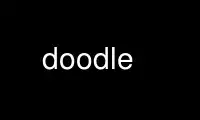
This is the command doodle that can be run in the OnWorks free hosting provider using one of our multiple free online workstations such as Ubuntu Online, Fedora Online, Windows online emulator or MAC OS online emulator
PROGRAM:
NAME
doodle - a tool to search the meta-data in your files
SYNOPSIS
doodle [OPTIONS] ([FILENAMES]*|[KEYWORDS]*)
DESCRIPTION
doodle is a tool to index files. doodle uses libextractor to find meta-data in files.
Once a database has been built, doodle can be used to quickly find files of which the
meta-data matches a given search-string. This way, doodle can be used to quickly search
your file system.
Generally, the first time you run doodle you pass the option -b to build the database.
Together with -b you specify the list of files or directories to index, for example
$ doodle -b $HOME
Indexing with doodle is incremental. If doodle -b is run (with the same database) twice
it will update the index for files that were changed. doodle will also remove files that
are no longer accessible. doodle will NOT remove files that are still present but no
longer specified in the argument list. Thus invoking either
$ doodle -b /foo /bar # or
$ doodle -b /foo ; doodle -b /bar
will result in the same database containing both the index for /foo and /bar. Note that
the only way to only un-index /foo at this point is to make /foo inaccessible (using for
example chmod 000 /foo or even rm -rf /foo) and then run doodle -b again.
In networked environments, it often makes sense to build a database at the root of each
file system, containing the entries for that file system. For this, doodle is run for
each file system on the file server where that file system is on a local disk, to prevent
thrashing the network. Users can select which databases doodle searches. Databases cannot
be concatenated together.
Once the files have been indexed, you can quickly query the doodle database. Just run
$ doodle keyword
to search all of your files for keyword. Note that only the meta-data extracted by
libextractor is searched. Thus if libextractor does not find any meta-data in the files,
you may not get any results. You can use the option -l to specify non-standard
libextractor plugins. For example, doodle could be used to replace the locate tool from
the GNU findutils like this:
$ alias updatedb="doodle -bn -d /var/lib/doodle/doodle-locate-db -l
libextractor_filename /"
$ alias locate="doodle -d /var/lib/doodle/doodle-locate-db"
OPTIONS
-a NUMBER, --approximate=NUMBER
do approximate matching with mismatches of up to NUMBER letters
-b, --build
build the doodle database (passed arguments are directories and filenames that are
to be indexed). In comparison with GNU locate the doodle binary encapsulates both
the locate and the updatedb tool. Using the -b option doodle builds or updates the
database (equivalent to updatedb), without -b it behaves similar to locate.
-d FILENAME, --database=FILENAME
use FILENAME for the location of the database (use when building or searching).
This option is particularly useful when doodle is used to search different types of
files (or is operated with different extractor options). Using this option doodle
can be used to build specialized indices (i.e. one per file system), which can in
turn improve search performance. When searching, you can pass a colon-separated
list of database file names, in that case all databases are searched. Note that
the disk-space consumption of a single database is typically slightly smaller than
if the database is split into multiple files. Nevertheless, the space-savings are
likely to be small (a few percent). You can also use the environment variable
DOODLE_PATH to set the list of database files to search. The option overrides the
environment variable if both are used. If the option is not given and DOODLE_PATH
is not set, "/var/lib/doodle" is used.
-e, --extract
print the extracted keywords for each matching file found. Note that this will
slow down the program a lot, especially if there are many matches in the database.
Note that if the options given for libextractor are different than the options used
for building the index the results may not contain the search string.
-f, --filenames
include filenames (full path) in the set of keywords
-h, --help
print help page
-i, --ignore-case
be case-insensitive
-l LIBRARIES, --library=LIBRARIES
specify which libextractor plugins to use (for building the index with -b or for
printing information about files with -e)
-L FILENAME, --log=FILENAME
log all encountered keywords into a log file named FILENAME. This option is mostly
useful for debugging.
-m LIMIT, --memory=LIMIT
use at most LIMIT MB of memory for the nodes of the suffix-tree (after that,
serialize to disk). Note that a smaller value will reduce memory consumption but
increase the size of the temporary file (and slow down indexing). The default is 8
MB.
-n, --nodefault
do not load the default set of plugins (only load plugins specified with -l)
-p, --print
make a human-readable screen dump of the doodle database (only really useful for
debugging)
-P PATH, --prunepaths=PATH
Directories to not put in the database, which would otherwise be. The environment
variable PRUNEPATHS also sets this value. Default is "/tmp /usr/tmp /var/tmp /dev
/proc /sys". This option can also be used when searching, in which case search
results in the specified directories will be ignored.
-v, --version
print the version number
-V, --verbose
be verbose
ENVIRONMENT
DOODLE_PATH
Colon-separated list of databases to search. Note that when building the database
this path must either only contain one filename or the option -b must be used to
specify the database file. Default is "/var/lib/doodle".
PRUNEPATHS
Space-separated list of paths to exclude. Can be overridden with the -P option.
NOTES
Doodle depends on libextractor. You can download libextractor from
http://gnunet.org/libextractor/.
Use doodle online using onworks.net services
